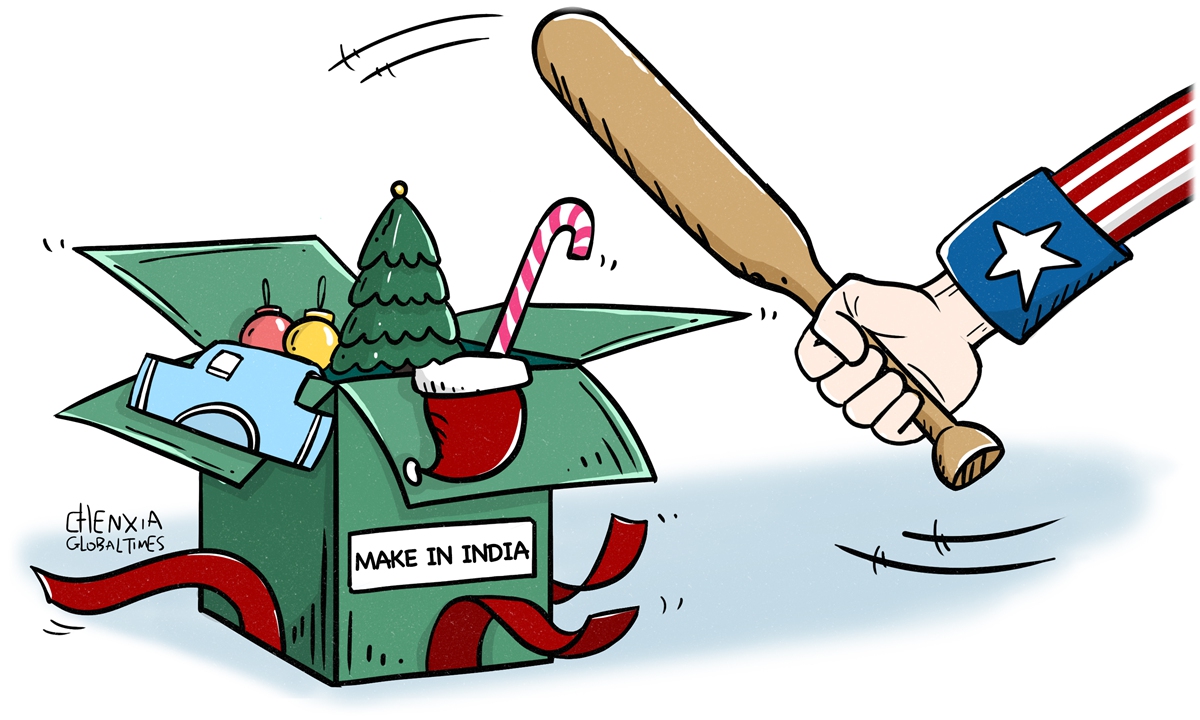
Illustration: Chen Xia/Global Times
India has broken into the top five suppliers of Christmas decorative items and T-shirts to the US, keeping the South Asian country in the race to be the next China, Bloomberg reported on Monday.Western media outlets have been hyping up the competition between India and China in an attempt to attract manufacturing firms from China to India. However, for India, that might not be good news. Given the US' track record on cracking down on trading partners with which it has massive trade deficit, India should be more concerned about how to deal with US trade protectionism.
Admittedly, competition exists in manufacturing sectors of China and India, but it is far different from those distorted and exaggerated reports. New Delhi should see the reality: India's manufacturing development can't be isolated from China's manufacturing, and "Make in India" cannot replace "Made in China."
The Christmas product export of one Chinese city - Yiwu in East China's Zhejiang Province - hit 1.75 billion yuan ($253 million) in the first seven months of 2022, more than 10 times of India's sea-borne shipments of festival goods and accessories to the US last month, according to media reports.
It seems that the US' attempt to induce industrial chain transfer from China have mainly benefited Southeast countries rather than India. India's plan to attract investment from the US and to undertake high-tech companies' projects to build up production facilities are not making significant progress.
For the past couple of years, US electronic vehicle maker Tesla has been talking with India over market access and the terms under which Tesla is considering making cars in the country, but Tesla CEO Elon Musk in late May suggested that Tesla may hold off on entering the Indian market.
If India further politicizes economic and trade issues with China and promotes the so-called industry replacement, this will only hurt the mutually beneficial economic and trade cooperation between China and India, eventually hurting India's own economy. If India's calculation is to build up its manufacturing competitive edge against China by boosting economic and trade cooperation with the US, it will also be counterproductive.
India has chosen the US' Indo-Pacific Economic Framework for Prosperity (IPEF) over Regional Comprehensive Economic Partnership (RCEP) - the world's largest free trade pact that has largely boosted regional trade since taking effect this year. Indian union minister of commerce and industry Piyush Goyal is visiting the US this week to attend the IPEF ministerial and participate in the India-US Strategic Partnership Forum.
Now it seems US-India trade is developing in a good direction. It was reported in June that the US overtook China to become India's largest trading partner in the 2021-2022 fiscal year. It is not surprising because the US has always been a very important trading partner of India. At the same time, however, India must be careful not to fall into the pit of "decoupling of China's economy and trade" dug by the US.
The US' IPEF lacks commitments in promoting regional economic and trade cooperation, and is more like a geopolitical tool. Many in Indian media have warned that it is best not to be too optimistic about the IPEF. India and the US may have quite a bit of disagreement on standard consistency. The framework only involves data, environment, labor and other issues, but there is no discussion on tariff reduction or exemption that regional countries care about, posing challenges rather than benefits for India.
India does maintain a trade surplus with the US, so India has always regarded the US as an important export market. However, as India's exports to the US increase, India has to face a thorny problem: how to deal with the US' stick of trade sanctions one day. After all, the US has a long track record of political suppression of trading partners to obtain its own improper economic benefits.
India-US relations have arrived at a critical juncture. Considering its own economic interests, the US will not hesitate to adopt protectionism against India. Therefore, New Delhi must carefully balance its economic and trade relations with the US and China. If India blindly harms its trade with China, it will be too late to regret it when it receives economic and trade crackdowns by the US in the future.
The author is a reporter with the Global Times. bizopinion@globaltimes.com.cn



